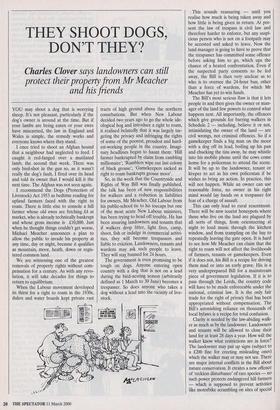THEY SHOOT DOGS, DON'T THEY?
Charles Clover says landowners can still
protect their property from Mr Meacher and his friends
YOU may shoot a dog that is worrying sheep. It's not pleasant, particularly if the dog's owner is around at the time. But if your lambs are being eaten or your ewes have miscarried, the law in England and Wales is simple, the remedy works and everyone knows where they stand.
I once tried to shoot an Afghan hound that a neighbour had neglected to feed. I caught it red-fanged over a mutilated lamb, the second that week. There was only bird-shot in the gun so, as it wasn't really the dog's fault, I fired over its head and told its owner that I would kill it the next time. The Afghan was not seen again.
I recommend the Dogs (Protection of Livestock) Act 1953 as bedtime reading for upland farmers faced with the right to roam. There is little else to console a hill farmer whose old ewes are fetching £4 at market, who is already technically bankrupt and whose gross income is £10,000. Just when he thought things couldn't get worse, Michael Meacher announces a plan to allow the public to invade his property at any time, day or night, because it qualifies as mountain, moor, heath, down or regis- tered common land.
We are witnessing one of the greatest removals of property rights without com- pensation for a century. As with any revo- lution, it will take decades for things to return to equilibrium.
When the Labour movement developed its thirst for a right to roam in the 1930s, dukes and water boards kept private vast tracts of high ground above the northern conurbations. But when New Labour decided two years ago to go the whole ide- ological hog and introduce a right to roam, it realised belatedly that it was largely tar- geting the privacy and infringing the rights of some of the poorest, proudest and hard- est-working people, in the country. Imagi- nary headlines began to haunt them: 'Hill farmer bankrupted by claim from rambling millionaire'; 'Ramblers wipe out last colony of black grouse'; 'Gamekeepers sacked as right to roam bankrupts grouse moor'.
So, in the week that the Countryside and Rights of Way Bill was finally published, the talk has been of new responsibilities for walkers and a reduction in liabilities for owners. Mr Meacher, Old Labour from his public-school tie to his toecaps but one of the most acute New Labour ministers, has been trying to head off trouble. He has been assuring landowners and tenants that if walkers drop litter, light fires, camp, shoot, fish or indulge in commercial activi- ties, they will become trespassers and liable to eviction. Landowners, tenants and wardens may ask such people to leave. They will stay, banned for 24 hours.
The government is even promising to be tough on dogs. Anyone entering open country with a dog that is not on a lead during the bird-nesting season (arbitrarily defined as 1 March to 30 June) becomes a trespasser. So does anyone who takes a dog without a lead into the vicinity of live- stock. This sounds reassuring — until you realise how much is being taken away and how little is being given in return. At pre- sent the law of trespass is civil law and therefore harder to enforce, but any suspi- cious person who is not on a footpath may be accosted and asked to leave. Now the land manager is going to have to prove that the trespasser has committed some offence before asking him to go, which ups the chance of a heated confrontation. Even if the suspected party consents to be led away, the Bill is then very unclear as to who is to oversee the 24-hour ban, other than a force of wardens, for which Mr Meacher has yet to win funds.
The Bill's most serious flaw is that it lets people in and then gives the owner or man- ager of the land few powers to control what happens next. All importantly, the offences which give grounds for barring walkers in Schedule 2 — including, believe it or not, intimidating the owner of the land — are civil wrongs, not criminal offences. So if a gamekeeper finds a big man on the moor with a dog off its lead, boiling up his pan and chucking the tins away, he may whistle into his mobile phone until the cows come home for a policeman to attend the scene. It will be up to the landowner, tenant or keeper to act as his own policeman if he wishes to bring an action. In practice, this will not happen. While an owner can use reasonable force, no owner in his right mind would lay hands on a trespasser for fear of a charge of assault.
This can only lead to rural resentment. There will be new tourist honeypots where those who live on the land are plagued by all sorts of things, from orienteering at night to loud music through the kitchen window, and from trampling on the hay to repeatedly leaving the gate open. It is hard to see how Mr Meacher can claim that the right to roam will not affect the livelihoods of farmers, tenants or gamekeepers. Even if it does not, his Bill is a recipe for driving them mad or into an early grave. His is a very underprepared Bill for a mainstream piece of government legislation. If it is to pass through the Lords, the country code will have to be made enforceable under the national, criminal law. It is the only fair trade for the right of privacy that has been appropriated without compensation. The Bill's astonishing reliance on thousands of local bylaws is a recipe for total confusion.
Clarity is needed by the law-abiding walk- er as much as by the landowner. Landowners and tenants will be allowed to close their land for at least 28 days a year. How will the walker know what restrictions are in force? The landowner may put up signs (subject to a £200 fine for erecting misleading ones) which the walker may or may not see. There are major internal conflicts in the Bill about nature conservation. It creates a new offence of 'reckless disturbance' of rare species — no such power protects endangered hill farmers — which is supposed to prevent activities like motorbike scrambling on sites of special scientific interest. It is difficult to see why a rambler walking a dog on a lead legally through a moor in the breeding season for ground-nesting birds such as black grouse, golden plover and snipe shouldn't be guilty of the same offence.
There will be no rolling back the right to roam. I suspect Michael Meacher and Tony Blair are right that it will be popular, as are all annexations of the powers of the few by the many. This confiscation will go through because it is in the interest of the middle classes — generally behind changes in the law — to have the option of a walk- ing holiday in the Forest of Bowland.
Maybe it will work. Scotland has rubbed along with a de facto freedom to roam. So do many north European countries. Land in England and Wales has seldom been owned without encumbrances from the king, the feudal lord, the gas board — so there are precedents. What New Labour may not get away with is removing private rights to pri- vacy without compensation. Such a case can only be brought by an individual landowner under the European Convention on Human Rights after the Bill becomes law. If one case succeeds, the Act falls.
What will be lost is the delicate equilibri- um which has evolved over centuries of English law, which protects the footpath user, be he ever so humble, and regulates the rights of the mightiest landowner. Lawyers from America or South Africa, where no such public accommodation exists, speak of it with awe. Case law surrounding the new right will take years to settle down. People will have to suffer the half truths and misunderstandings: already there are reports of people exercising a 'right to roam' where none exists, on cultivated land.
In fact, the portents are not good. Where open access exists already (open access agreements were established by the National Parks Act of 1949, subject to compensation being paid) the country code is widely abused. Dogs on open- access moors are meant to be taken on a lead, but a study on Saddleworth Moors in the Peak District national park showed that 66 per cent of visiting dogs were off the lead and 8 per cent ran wild. If the right to roam is to be respected, everyone must have something to lose from its abuse, to balance the loss that those who manage the land have suffered already. If the Bill continues to offer them scant redress, a lot of already marginalised rural folk are going to feel very socially excluded indeed. Unable to evict offenders from his land, threatened regularly with assault, ignored by the police, the hill farmer will grab at any legal remedy open to him — step forward the Dogs (Protec- tion of Livestock) Act of 1953. Next time Fido leaps out of the car and goes gam- bolling up the hill, scattering sheep and grouse, he could make someone's day.
Charles Clover is environment editor of the Daily Telegraph.



































































 Previous page
Previous page